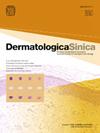Hand eczema and its severity in nonmedical personnel: A study of the use of hand sanitizer on transepidermal water loss and skin capacitance
IF 2.2
4区 医学
Q2 DERMATOLOGY
引用次数: 0
Abstract
An increased frequency of hand sanitizer use and washing hands with soap seems to increase the incidence of hand eczema (HE). The aim was to analyze HE in nonmedical personnel, its severity, and the effect of hand sanitizer use on transepidermal water loss (TEWL) and skin capacitance. This observational cross-sectional study was conducted from July to September 2022. Subjects were recruited based on the study criteria with cluster random sampling method. Each subject’s identity, data related to hand sanitizer use and handwashing, atopic stigmata, and duration of HE were documented. The severity of HE was assessed with the HE Severity Index (HECSI). TEWL and skin capacitance were measured with the Tewameter® TM 300 and Corneometer® CM 825 instruments. Out of 240 subjects who were selected randomly, 24 normal subjects and 24 subjects with HE were recruited. The incidence of HE in nonmedical personnel using hand sanitizer was 10%, with a median disease duration of 22 weeks and a mean HECSI score of 9.25 ± 6.33. There was no significant difference in TEWL and skin capacitance between the groups (P > 0.05). There was no significant correlation between TEWL and skin capacitance with the HECSI score (P > 0.05). Subjects with HE washed their hands more frequently than subjects without HE (6 vs. 4.5 times per day; P 0.005). Most nonmedical personnel with HE had a mild form of the condition. There were no significant barrier function and skin hydration differences between the groups.非医务人员的手部湿疹及其严重程度:使用洗手液对经表皮失水和皮肤电容的影响研究
使用洗手液和用肥皂洗手的频率增加似乎会增加手部湿疹(HE)的发病率。 本研究旨在分析非医务人员手部湿疹的发病率、严重程度以及使用洗手液对经表皮失水(TEWL)和皮肤电容的影响。 这项横断面观察研究于 2022 年 7 月至 9 月进行。受试者是根据研究标准以整群随机抽样方法招募的。研究人员记录了每位受试者的身份、洗手液使用和洗手相关数据、特应性症状和 HE 持续时间。HE 严重性指数(HECSI)用于评估 HE 的严重程度。使用 Tewameter® TM 300 和 Corneometer® CM 825 仪器测量 TEWL 和皮肤电容。 在随机抽取的 240 名受试者中,有 24 名正常受试者和 24 名 HE 受试者。使用洗手液的非医务人员的 HE 发病率为 10%,中位病程为 22 周,HECSI 平均得分为 9.25 ± 6.33。各组之间的 TEWL 和皮肤电容无明显差异(P > 0.05)。TEWL和皮肤电容与HECSI评分无明显相关性(P > 0.05)。患有 HE 的受试者比没有 HE 的受试者洗手更频繁(每天 6 次对 4.5 次;P 0.005)。 大多数患有 HE 的非医务人员病情较轻。各组之间在屏障功能和皮肤水合作用方面没有明显差异。
本文章由计算机程序翻译,如有差异,请以英文原文为准。
求助全文
约1分钟内获得全文
求助全文
来源期刊

Dermatologica Sinica
DERMATOLOGY-
CiteScore
2.80
自引率
20.00%
发文量
28
审稿时长
>12 weeks
期刊介绍:
Dermatologica Sinica aims to publish high quality scientific research in the field of dermatology, with the goal of promoting and disseminating dermatological-related medical science knowledge to improve global health. Articles on clinical, laboratory, educational, and social research in dermatology and other related fields that are of interest to the medical profession are eligible for consideration. Review articles, original articles, brief reports, case reports and correspondence are accepted.
 求助内容:
求助内容: 应助结果提醒方式:
应助结果提醒方式:


